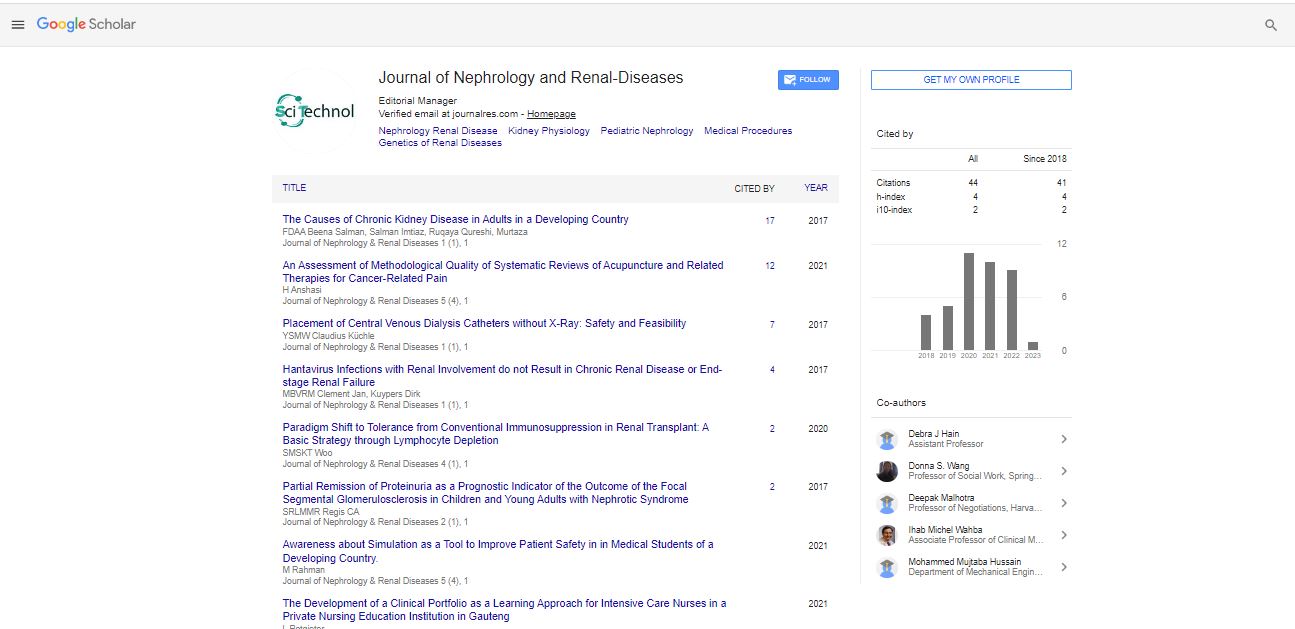Perspective, J Nephrol Ren Dis Vol: 7 Issue: 2
Challenges and Interventions in Renal Failure Management
Chunxia Jordi*
Department of Urology, University of the Ryukyus, Okinawa, Japan
*Corresponding Author: Chunxia Jordi,
Department of Urology, University of the
Ryukyus, Okinawa, Japan
E-mail: chunjord@u-ryukyu.ac.jp
Received date: 22 May, 2023, Manuscript No. JNRD-23-107009;
Editor assigned date: 25 May, 2023, PreQC No. JNRD-23-107009 (PQ);
Reviewed date: 08 June, 2023, QC No. JNRD-23-107009;
Revised date: 15 June, 2023, Manuscript No. JNRD-23-107009 (R);
Published date: 22 June, 2023, DOI: 10.4172/2576-3962.1000035
Citation: Jordi C (2023) Challenges and I nter v entions in Renal Failure M anagement. J Nephrol Ren Dis 7:2.
Description
Renal failure refers to the loss of kidney function, leading to the accumulation of waste products and disturbances in fluid and electrolyte balance. Understanding the complexities of renal failure is important for early detection, appropriate interventions and optimizing patient outcomes.
Renal failure, a condition characterized by a decline in kidney function, poses significant challenges in clinical practice. It can arise from various etiologies, including Acute Kidney Injury (AKI) and Chronic Kidney Disease (CKD). The effects of renal failure are extensive, affecting multiple organ systems and requiring prompt and appropriate management.
Renal failure disrupts the intricate processes involved in maintaining fluid and electrolyte balance, acid-base homeostasis and waste elimination. In AKI, the underlying mechanisms often involve renal ischemia, nephrotoxic insults or obstructive uropathy, leading to tubular damage, inflammation and impaired glomerular filtration. In CKD, progressive and irreversible loss of nephrons occurs due to various etiological factors, including diabetes, hypertension, glomerulonephritis and polycystic kidney disease. The common end result is a decrease in Glomerular Filtration Rate (GFR) and the subsequent impairment of kidney function.
Timely and accurate diagnosis of renal failure is essential for appropriate management. Diagnostic evaluation involves a combination of medical history, physical examination, laboratory tests (including measurement of serum creatinine, blood urea nitrogen and electrolyte levels), urine analysis and imaging studies (such as renal ultrasound). Additional investigations, including renal biopsy and specialized tests, may be necessary in certain cases to determine the underlying cause and guide management decisions.
Management strategies for renal failure depend on the type, underlying cause and severity of kidney dysfunction. In AKI, interventions focus on identifying and treating the underlying cause, optimizing hemodynamic stability and managing fluid and electrolyte imbalances. In CKD, management aims to slow disease progression, prevent complications and manage associated comorbidities. This includes lifestyle modifications (such as dietary changes and smoking cessation), pharmacological interventions (such as blood pressure control and management of metabolic abnormalities) and close monitoring of renal function. For advanced CKD, renal replacement therapies, including dialysis or kidney transplantation, may be necessary.
Renal failure is associated with a range of complications that can significantly impact patient outcomes and quality of life. These complications include electrolyte imbalances, fluid overload, anemia, mineral and bone disorders, cardiovascular complications and an increased risk of infections. Early identification and management of these complications, along with regular follow-up and monitoring, can help mitigate their impact and improve long-term prognosis.
Continued analysis in the field of renal failure aims to identify novel biomarkers for early detection, develop targeted therapeutic interventions to halt disease progression and refine management strategies. Emerging areas include regenerative medicine, precision medicine approaches and the development of new therapeutic modalities to enhance kidney repair and regeneration.
Conclusion
Renal failure is a complex condition characterized by the loss of kidney function and disruption of essential physiological processes. Understanding the underlying pathophysiology, diagnostic approaches, and management strategies is crucial for healthcare providers involved in the care of patients with renal failure. By implementing evidencebased practices and continuing the analysis, healthcare professionals can strive to improve patient outcomes and enhance the quality of life for individuals with renal failure.
 Spanish
Spanish  Chinese
Chinese  Russian
Russian  German
German  French
French  Japanese
Japanese  Portuguese
Portuguese  Hindi
Hindi 
